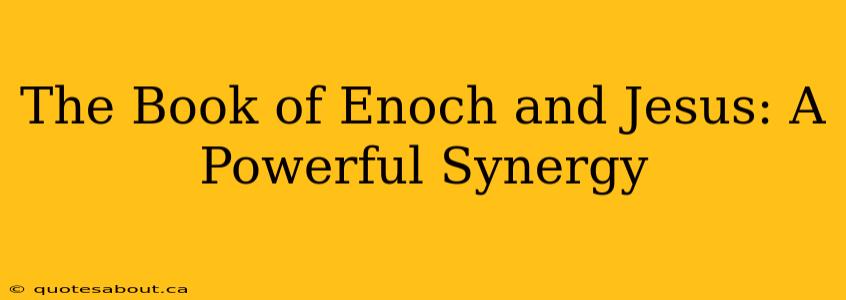The Book of Enoch, an ancient Jewish text excluded from the canonical Hebrew Bible but revered within certain Christian traditions, offers intriguing parallels and potential connections to the life and teachings of Jesus. While not explicitly mentioned in the New Testament, exploring the themes and narratives within Enoch reveals a fascinating synergy that enriches our understanding of both texts and their respective theological landscapes. This exploration delves into the shared spiritual concepts and prophetic elements that intertwine these two significant religious figures.
What is the Book of Enoch?
The Book of Enoch, attributed to the biblical Enoch, is a collection of apocalyptic and visionary writings dating back to the second century BCE to the first century CE. It depicts Enoch's ascent to heaven, his visions of celestial realms, and prophetic pronouncements concerning the future, including the coming of divine judgment and the ultimate triumph of good over evil. The text is not uniform, composed of diverse sections with varying styles and theological perspectives. Its significance lies in its portrayal of a heavenly hierarchy, angelic rebellion, and the concept of a coming Messiah—themes that resonate strongly with certain aspects of Christian theology.
Does the Book of Enoch Influence the New Testament?
While the New Testament doesn't directly quote the Book of Enoch, scholars have identified potential thematic influences. The concept of angelic rebellion, vividly depicted in Enoch's account of the Watchers' fall, finds echoes in the New Testament's descriptions of Satan and his demonic forces. The imagery of a cosmic battle between good and evil, a central motif in Enoch, also resonates with the New Testament’s portrayal of Christ's struggle against the powers of darkness. Furthermore, Enoch's prophecies of judgment and the coming of a messianic figure could have indirectly shaped the development of apocalyptic and eschatological themes in early Christian thought.
What are the Key Similarities Between the Book of Enoch and the Teachings of Jesus?
Several key similarities link the Book of Enoch and the teachings of Jesus, fostering a sense of spiritual synergy:
Emphasis on Righteousness and Judgment:
Both Enoch and Jesus emphasize the importance of righteousness and warn of impending divine judgment. Enoch's visions detail the consequences of wickedness and the coming of a great judgment, while Jesus's teachings frequently focus on the necessity of repentance, ethical conduct, and the ultimate judgment of God.
The Coming of the Messiah:
While the specific details differ, both texts anticipate the arrival of a messianic figure. Enoch’s prophecies allude to a future leader who will bring justice and establish a righteous kingdom. This resonates with the Christian belief in Jesus as the Messiah, who came to establish God's kingdom on Earth.
The Importance of Repentance:
Both Enoch and Jesus stress the necessity of repentance and turning away from sin. Enoch's visions portray God's mercy alongside his judgment, highlighting the importance of seeking forgiveness and amending one's ways. Similarly, Jesus's ministry heavily emphasizes the importance of repentance and forgiveness as pathways to salvation.
How Does the Book of Enoch Contribute to Our Understanding of Jesus?
The Book of Enoch, while not canonical scripture, offers a valuable historical and theological context for understanding the development of early Christian thought. Its themes of angelic rebellion, divine judgment, and the messianic hope provide a backdrop against which the New Testament narratives unfold. By studying Enoch, we gain a deeper appreciation of the intellectual and spiritual climate within which early Christians interpreted and understood their own scriptures and beliefs about Jesus.
Why is the Book of Enoch Not in the Bible?
The exclusion of the Book of Enoch from the biblical canon is a complex issue involving historical, theological, and editorial considerations. Early church councils made decisions regarding which texts were deemed authoritative scripture. Factors such as authorship, consistency with other scriptures, and theological coherence played a role in the decision-making process. The Book of Enoch's diverse authorship and sometimes seemingly contradictory elements likely contributed to its exclusion. It’s important to note that its exclusion doesn't diminish its historical or theological significance.
Is the Book of Enoch Essential to Understanding Christianity?
While the Book of Enoch is not essential for understanding the core tenets of Christianity, it offers valuable insights into the broader intellectual and spiritual landscape within which Christianity emerged. Studying it can enrich our understanding of the historical development of Christian theology and the diverse perspectives that shaped early Christian belief. It provides a glimpse into the rich tapestry of Jewish apocalyptic literature and its influence on early Christian thought. Therefore, while not central, it offers a valuable supplementary perspective on the historical and theological context of Christianity.
This exploration only scratches the surface of the complex interplay between the Book of Enoch and the life and teachings of Jesus. Further study will reveal even richer nuances and potential connections between these two significant texts.

